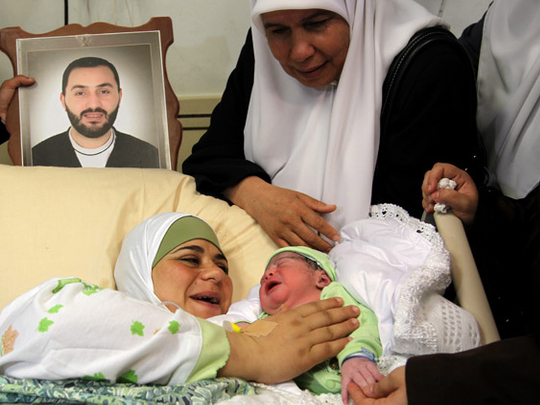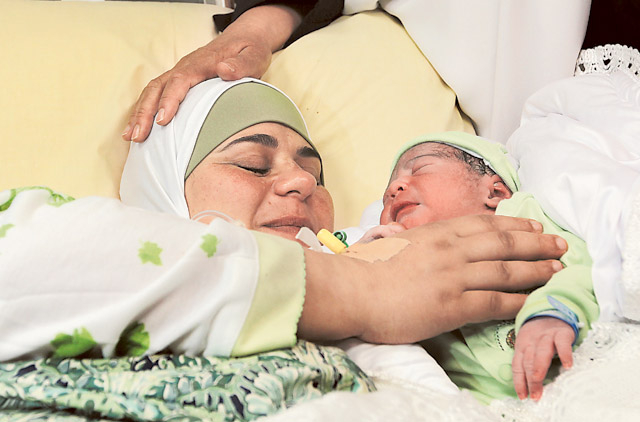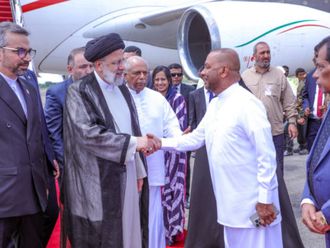
Dubai: A baby boy was born by Caesarean section late on Sunday, the product of a successful smuggling attempt by a Palestinian prisoner who managed to sneak out a sperm sample to his wife.
Baby Mohannad was born in a Nablus hospital to Dallal Ziben, a 32-year-old mother-of-two from a village in the northern West Bank, whose husband Ammar is serving 27 life sentences in an Israeli prison.
“It was Ammar’s idea, and I agreed to it [to have a test-tube baby], and thank God, we were blessed,” the mother told Gulf News on Tuesday afternoon.
“This is the third attempt, and thank God, it worked out,”
“I am very, very happy. Praised be the God, we have now Mohannad after this long separation [from my husband] and this many years in prison and injustice. I am extremely happy,” she said.
Mohannad, whose name in Arabic means the sword, has two sisters, Bashae’r, 16, and Bissan, 14.
Mohannad was 3.8kg when he was born late on Sunday.
“He looks like his father and his elder sister,” Dallal said. “ He has some similarities with me too.”
“Ammar had a very dear friend to him who was martyred in 2003. He said then, ‘if God gives me a son, I am going to name him Mohannad.’ Thank God, he was given the son.”
Ammar is serving 27 life terms and another 25 years for his role in fighting the Occupation
Palestinians are not permitted to receive conjugal visits, and although Dallal has not set eyes on her husband for 15 years, she says she fell pregnant after being artificially inseminated by sperm her 37-year-old husband managed to sneak out of Hadarim prison in central Israel.
“Praise be to Allah who has blessed us after a long absence with my husband in prison,” Dallal said shortly before going in for an elective Caesarean.
“My husband and I, our two girls and the family have been waiting for this for such a long time,” she said.
When Ziben, who comes from Meithalun village between Nablus and Jenin, was arrested, Basha’er was just 18 months old.
At the time, she was also five months pregnant with their second daughter, Bissan.
Dream come true
“I am very happy. This is the first genuine happiness in our house for more than 15 years,” said Basha’er, now 16.
“When my mother told us she was going to get inseminated and give us a baby brother, we couldn’t believe it,” she said. “We have always wanted a brother and now the dream has come true.”
After the expectant mother was wheeled into the operating theatre, a group of women from the family gathered outside to wait, breaking into celebratory ululation at the first sound of a baby crying.
Standing outside the operating theatre, the proud grandmother said her son-in-law had named the baby after one of his friends “who was a martyr.”
Asked if the family objected to the way her daughter fell pregnant, she responded angrily.
“We are honourable people who are known for our good reputation and everyone supports us,” she snapped.
For her son-in-law, who no longer has any immediate family living in the Palestinian territories, having a boy gives him a way of prolonging his line, she said, explaining that his mother, father and brother had died, and that a second brother was living overseas.
Details of how the sperm was smuggled out of the prison was kept a closely guarded secret, with the family refusing to give the slightest information.
A spokeswoman for the Israel Prisons Service said she was not aware of the pregnancy, and that security prisoners were not allowed conjugal visits, with the Palestinian Prisoners’ Club confirming the same information.
“Visits by prisoners’ wives are closely supervised by prison guards and there is no way a prisoner could get time alone with his wife,” said a Nablus-based spokesman.
Dr Salem Abu Al Kheizaran, head of the Razan fertility clinic in Nablus which carried out the insemination procedure, said the sperm had been subjected to a gender separation process to ensure the couple would have a son.
“We received a sample of sperm from the husband in a reliable and clinically secure way,” he told AFP, without going into details.
“The couple wanted a baby boy, so we carried out a gender separation procedure. We tried the insemination process three times from the same sample, but the first two attempts failed,” he said.
Abu Al Kheizaran said the right to have a baby was a universal human right.
“For us it is a humanitarian issue — everyone has the right to be a parent. Prison must not stand in the way of this right,” he told AFP.
Samer Samaro from the Nablus branch of the prisoners’ ministry agrees.
“Having the child is a prisoner’s right. We hope to someday reach an agreement with the Israeli side about this issue,” he said.
Samaro said that even Israelis were allowed that right, including Yigal Amir, the right-wing extremist who gunned down prime minister Yitzhak Rabin in November 1995.
Amir, who was caught trying to smuggle sperm out of prison in 2006, was later given permission to artificially inseminate his wife, who gave birth to a son in 2007.
Says Samaro: “Even Rabin’s murderer had a baby while he was in prison, so why should Palestinians be deprived of that right?”
— With inputs from AFP













